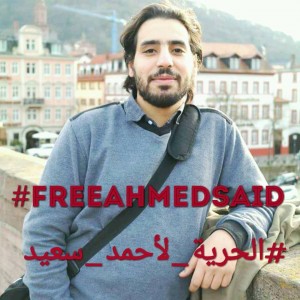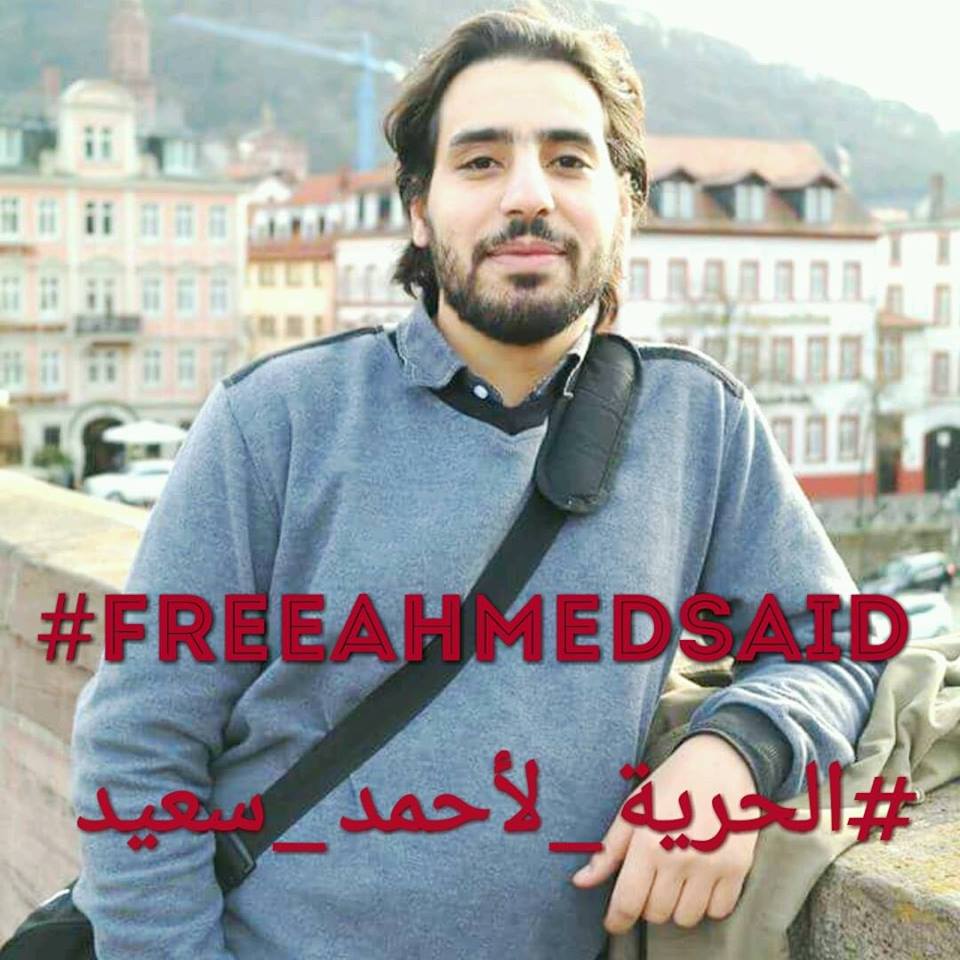 The undersigned organizations are gravely concerned for the health and physical safety of Dr. Ahmed Said, who is currently detained in the Tora maximum security facility, known as the Aqrab Prison, in connection with his participation in a peaceful demonstration on November 19, 2015 held to commemorate the events of Mohammed Mahmoud. Yesterday, February 17, he was moved into solitary confinement as a disciplinary measure, though no cause was given, and his family was prohibited from visiting him or supplying his basic needs of clothing, medicine, blankets, and food. Indeed, the prison denied dozens of family visits yesterday after family members stood in front of the prison gates for hours. The undersigned organizations condemn the intransigence shown by the prison administration to detainees’ families. Only a handful of family members were allowed ten-minute visits. Some family members were allegedly assaulted, and the prison is said to have refused to give inmates the food and other basic items brought to them by family. As a result, several detainees staged a hunger strike to protest the ill treatment, while prisoners’ families have organized a protest for Thursday on the steps of the Journalists Syndicate to condemn their treatment.
The undersigned organizations are gravely concerned for the health and physical safety of Dr. Ahmed Said, who is currently detained in the Tora maximum security facility, known as the Aqrab Prison, in connection with his participation in a peaceful demonstration on November 19, 2015 held to commemorate the events of Mohammed Mahmoud. Yesterday, February 17, he was moved into solitary confinement as a disciplinary measure, though no cause was given, and his family was prohibited from visiting him or supplying his basic needs of clothing, medicine, blankets, and food. Indeed, the prison denied dozens of family visits yesterday after family members stood in front of the prison gates for hours. The undersigned organizations condemn the intransigence shown by the prison administration to detainees’ families. Only a handful of family members were allowed ten-minute visits. Some family members were allegedly assaulted, and the prison is said to have refused to give inmates the food and other basic items brought to them by family. As a result, several detainees staged a hunger strike to protest the ill treatment, while prisoners’ families have organized a protest for Thursday on the steps of the Journalists Syndicate to condemn their treatment.
The undersigned organizations hold the administration of the Aqrab Prison fully responsible for the safety of Ahmed Said and call on the president to use his constitutional authority to secure the release of Said and others imprisoned for exercising their right to peaceful protest, whether under the repressive law, the 1914 assembly law issued by the British colonial powers, or the Penal Code.
Dr. Said’s case exemplifies the abuses faced by political prisoners in Egypt, who are punished for exercising their right to express their opinion. Said will spend two years in the notorious Aqrab Prison for taking part in a peaceful protest to commemorate the victims of the Mohammed Mahmoud clashes. In the three months of his sentence, Said has already faced a series of violations: he was tortured with electroshocks and beaten at the Abdeen police station, denied medicine, blankets, and winter clothing to force him to end his hunger strike in protest at degrading treatment in the May 15 Prison, and most recently placed in solitary confinement at Aqrab.
Said is an Egyptian surgeon in his 30s who worked in many of the field hospitals set up during and after the revolution of January 25, 2011. In late 2012, Said traveled to Germany to complete his medical training and take up a position in a hospital there. He was arrested two days before the end of his annual vacation in Egypt, being set to return to work in Germany on November 22, 2015.
On November 20, 2015, the Abdeen Prosecution charged Said and four others—Mustafa Ibrahim Mohammed Ahmed, Karim Khaled Fathi, Mohammed Abd al-Himid, and Jamila Sirri al-Din—for participating in an unlicensed demonstration, taking part in an assembly of more than five people, obstructing public roads, and possessing publications likely to disturb the public order. On December 13, 2015, the first-instance court sentenced the five defendants to two years in prison in the first trial session; the Abdeen Misdemeanor Appellate Court upheld the sentence on January 27, 2016.
On December 14, 2015, Ahmed Said was placed in the May 15 Prison, where he staged a hunger strike after being placed in solitary confinement the first day and was denied medicine, winter clothing, blankets, and exercise. As a result, his health declined markedly in prison, prompting several members of the Doctors Syndicate to file requests and complaints with the public prosecutor and the deputy interior minister for prisons, asking that Said be moved to the prison hospital and be allowed visits. The prison administration only agreed to move him after Said signed a statement pledging to end his hunger strike.
The prison authorities then moved Said—not to the prison hospital, but to a harsher prison, the maximum security Aqrab facility. There he continued to be denied visits, as well as food, blankets, and medicine from his family. He was even denied pens and paper. He was placed in solitary confinement yesterday, February 17. In light of this, the undersigned organizations express genuine fears that he will be subject to torture and beating.
The undersigned organizations renew their call for the formation of an independent commission of rights advocates and civil society organizations to examine prison conditions and allegations of torture and collective punishment, particularly at the infamous Aqrab Prison.
Signatory organizations:
- Cairo Institute for Human Rights Studies
- The Egyptian Association for Community Participation Enhancement
- Arab Network for Human Rights Information
- The Egyptian Initiative for Personal Rights
- Alhaqanya Foundation of Rights and freedoms
- The Egyptian Center for Economic and Social Rights
- El-Nadeem Centre for the rehabilitation of victims of violence and torture
- Andalus Institute for Tolerance and Anti-Violence Studies
- Habi Center for Environmental Rights
- Hesham Mobarak Law Center
- Appropriate Communications Techniques for Development (ACT)
- Egyptian Commission for rights and freedoms
- Association for Freedom of Thought and Expression
- Center for Egyptian Women’s Legal Assistance
- Nazra for Feminist Studies
- National group for human rights and law
Share this Post

